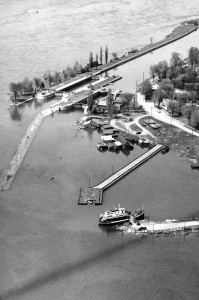Reprinted from 11 July 2018 – weekly dive debriefing.
Those of you who have been diving with me over the years know that one of my least favourite statements is, “It’s better to be heavy than worry about weight… and especially in current”. Nope… wrong. It’s worse. Heavy divers work too hard, can’t maneuver properly, and have a great deal of trouble moving up and down in the water, whether they’re in current or not. Here’s why…
At the start of the dive it’s true that with extra weight you have no trouble descending. In fact, in our environment it’s kind of nice not having to think about the boats overhead – you hang low, follow your guide, and gradually move downward until you’re on the bottom… and there you stay. You struggle to rise into a nice, neutrally buoyant position.
You may find yourself bouncing along, pushing yourself up with your hands while inflating your BCD. If you try to let a bit of air out again, you hit the dirt again. Up and down, up and down. Or you finally get neutrally buoyant if your BCD is full of air… but this raises your torso so that your legs hang low behind you. You kick like mad to move. We call this “bicycling” because it’s exactly what you look like to others. It’s fatiguing. You use a lot of air. And unless you’re well above the bottom you kick up a LOT of silt. If you’re working this hard, you’re not going to spend much time enjoying the surroundings!
So why do new divers (and many, many experienced divers) carry too much weight? First of all, in your Open Water certification dives, you probably had trouble descending, and your instructors gave you additional weight to help you get off the surface. You were wearing a lot of cold water gear, were anxious, and were breathing quickly and shallowly (retaining air in your lungs) whether you were aware of it or not. Now you arrive at your first dive with us with the same weight – but probably less gear, and in warmer water, although I do not doubt that your anxiety level is still pretty high.
You may on the other hand have many dives behind you and you were neutral in your gear last year… but you bought new (and therefore really buoyant) or rented different stuff this year. Perhaps you have a steel tank instead of aluminum. And you’re a lot calmer.
What do you do about it now? Firstly, pay attention to how much weight you have! When asked, don’t just respond, “I don’t know – it’s what they gave me.” Count out the pounds. It’s your starting point. Then look at your gear and note those details as well. For a 7mm wetsuit with or without hood and with light gloves and an aluminum tank (standard rental tanks), start with the ballpark figure of 10% of your weight in pounds. We usually discuss this at the start of the dive and come up with an amount that seems reasonable. We have extra weights hanging around that we can lend you if you need them.
When you enter the water, get your gear really saturated. Make sure your BCD is EMPTY. And let out a long slow breath when it’s time to descend. I talk a lot about “heavy thoughts” at the start of a dive. Weights are all about getting off the surface – you only need to descend 3 or 4 feet before the water pressure takes over.
Notice how you’re moving during your dive. Are you “bouncing”? Are you kicking a lot? Are you constantly filling your BCD and then emptying it? When you look back do you see nothing but silt? Does your back hurt?
At the end of your dive, an aluminum tank that is less than half full starts to give you a bit of additional lift. If you’re still having to inflate at that point, you know you’re heavy. Make a note to drop a couple of pounds next time. And maybe a couple the time after that. Once you get your weight correct, you’ll find you use less air and you move comfortably through any water conditions, whether it’s with current, against current, over walls, around obstacles, or sitting at your safety stop.
We saw a number of divers shed a lot of weight last night… and looking forward to their next more buoyant dive.
Good diving to you!
Sydney

